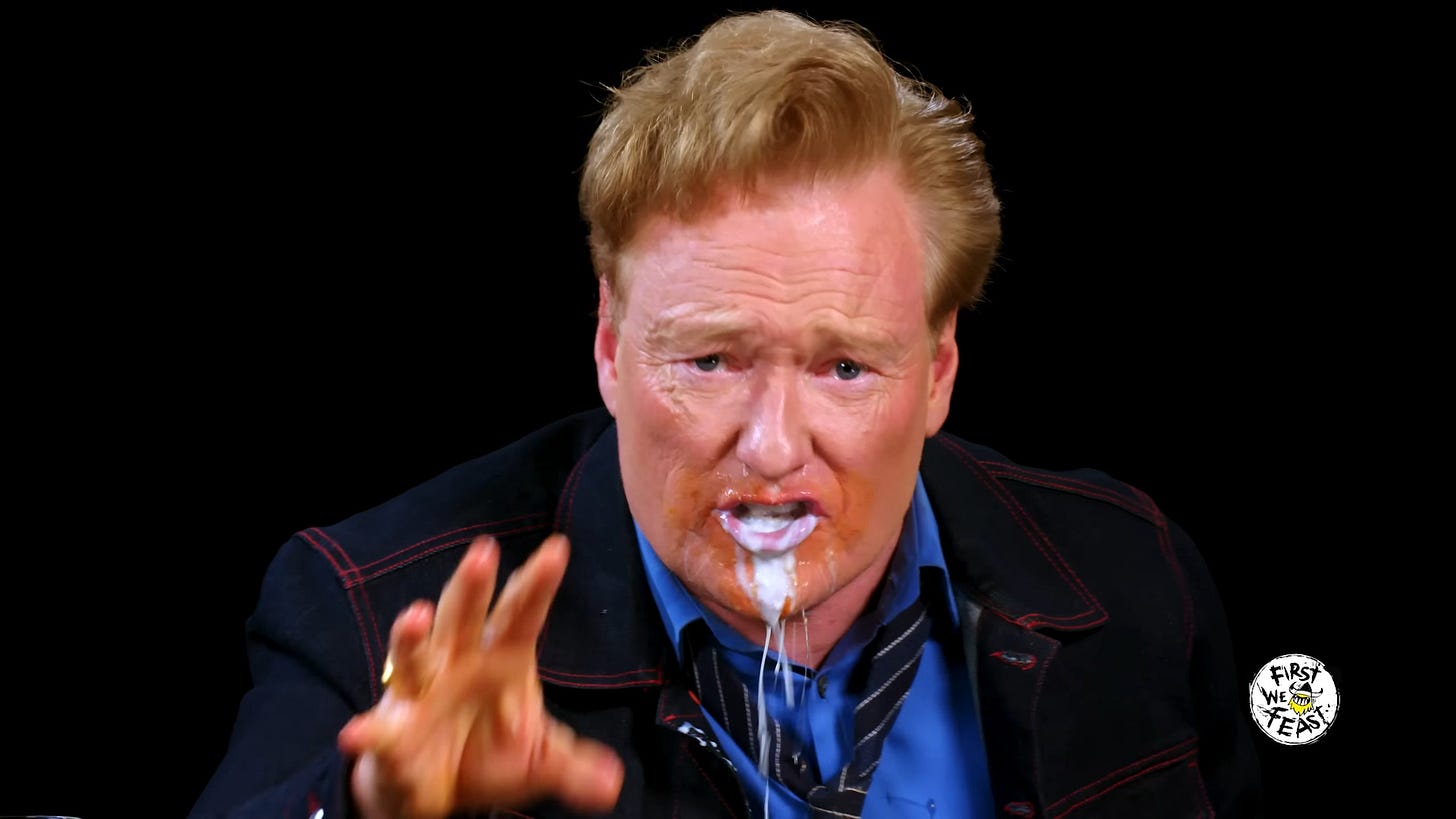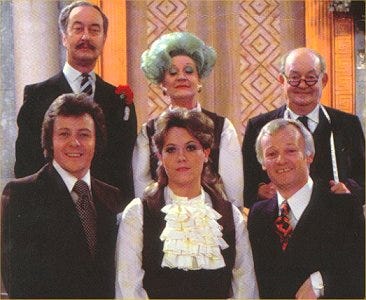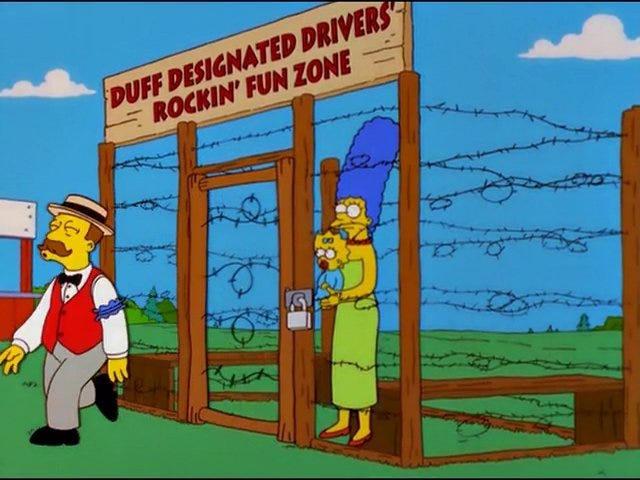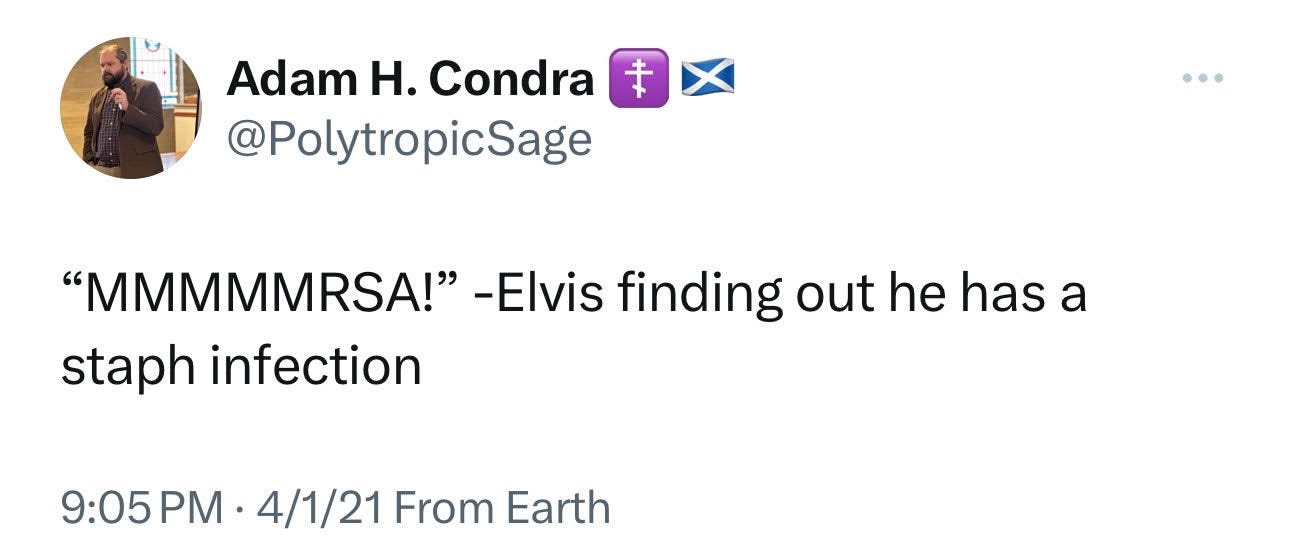Submission to Form: Comedy
Or, How My Parents Made Me a Comedian
As I sit here, I have a month left in the Circe Apprenticeship. A full reckoning of this wonderful thing will come later. What I want to focus on today is Wendell Berry and the things he has led me to contemplate now that we’ve been properly acquainted via the apprenticeship. This is likely to develop into an ongoing series. I’ve only read the two essays of his that have been assigned to me so far, but I can already tell that his influence on me is going to be titanic. A moment of lament: if someone had handed me a copy of Standing By Words when I was 18, I’d probably still be where I am (glory to God), but I’d be about $150,000 richer, a bachelor’s degree lighter, and a lot more courageous. Anyway.
Berry’s essay “Poetry and Marriage” has formally immersed me into a concept I’ve known to be true my whole life and heard echoed by everyone from my fellows in the Classical Renewal to the early church fathers to the philosophers who preceded them: freedom in the form.
Freedom in the form sounds oxymoronic and paradoxical, and is a little tricky to explain, but it’s incredibly important. Berry’s essay compares poetry to marriage, saying that both are forms bound in words that demand fidelity to the structure that the poet or the spouse submits to. Structure is inherently limiting, reducing the choices a writer or spouse can make in the course of their activity. A poet writing a sonnet has to submit to the form of the sonnet, and this restricts him or her to the words, syllables, and rhymes that can fulfill the form. Likewise, a spouse must restrain their passions and make sacrifices for the good of the marriage. In both cases, the freedom that is evinced is born of fulfillment to the restrictions in place. It is not a freedom of license, but a freedom of realization, of being a poet or a husband or wife. That realization is beautiful.
Forms exist everywhere. Berry defines them thus: “When understood seriously enough, a form is a way of accepting and of living within the limits of creaturely life.” We submit ourselves to them to fulfill our souls. When we abandon the form, however, we abandon the thing we wish to realize, and we sever ourselves from the way of life it could lead us to. Sometimes that’s necessary, a discussion for another time. What makes this concept difficult is the knowledge that not every freedom is available to us. As much as I wanted to in the ‘90s, I was never going to realize being an NBA player. No amount of submission to the form would get me there (It might have gotten me as far as, I don’t know, the bench at Middlebury. No offense, Middlebury. Or Middlebury’s bench). The form of our very self opens some doors and closes others.
However, I will argue, there’s an inverse to this disappointing aspect of freedom in the form, which is that some forms can manifest capriciously and develop- or innovate, perhaps -certain freedoms within us. These manifestations can be intentional or unintentional, and in thinking about this topic, about the forms that I have submitted to throughout my life, one of the forms that has given me fruit I hold most dearly feels entirely accidental. The freedom I have found in it is the result of unintended-but-no-less-effective rules and choices that my parents made, a form imposed by them, that’s given me my sense of humor. I’m talking about comedy.
These thoughts were provoked by Conan O’Brien’s recent appearance on the YouTube talk show Hot Ones. It’s a great show to begin with, boasting a fun gimmick and well-researched questions, and Conan’s episode is an instant classic. His interview set off a week-long revelry on Twitter in which people reminisced about their favorite Conan sketches and jokes from the last 30 years. It was the kind of fond adulation that’s typically reserved for the newly dead, but the fact that he’s still alive and just as ridiculous as ever only fueled the celebration.
For folks who don’t know, and I think there are enough new people among you to say that, I was a stand-up comic from 2014 to 2019. I might pick it up again someday, who knows, but I was able to do it long enough to make an album, which I’m pretty proud of. It wasn’t the healthiest time in my life, but I consider it creative time well spent, and I’m fond of all the people I met doing it.
Conan was always a strong influence on me, and in thinking about the memories I have of him growing up, the manner in which I encountered his show, and all the other influences and various comedic rabbit holes that captured the attention of my youth and developed my tastes, I started to notice just how much of it was limited and shaped by my parents. Comedy has been a very important and influential force to me, but I’ve never really thought of it in those terms because of the form in which my parents gave it to me. I don’t know how aware they are of it, I think in their minds they just wanted me to have good taste, but Berry’s essay is now revealing what that form was.
My sisters and I grew up in a fairly strict household, at least compared to our peers. We had one TV, with a rabbit ear antenna, and that TV stayed off during the week. I’d go to school and hear about Nickelodeon and MTV and Cartoon Network and fume about all the stuff I thought I was missing out on. Where we lived usually only picked up three networks: NBC, Fox, and PBS, so when we were watching TV, it was usually a movie on VHS or a show on one of those networks.
My comedy diet started with PBS on Saturday nights. From the time I was about 7, PBS reserved Saturday nights exclusively for cheaply obtained British sitcoms. Vicar of Dibley, Waiting for God, Keeping Up Appearances, Chef!, As Time Goes By, Yes Minister, Yes Prime Minister, The Good Life- all of these wove in and out of the schedule, along with the odd Canadian import like The Red Green Show (itself a treasure trove of bespoke comedic genius). But the show my parents were always most excited to watch was Are You Being Served?, a four-camera standard about retail workers set in a supposedly upscale clothing store.
Now, I liked Are You Being Served? because my parents liked Are You Being Served?, and I wanted to laugh at the things they laughed at. For me as a kid, it was mostly the surface level aspects of the show- John Inman answering the phone with “Menswear.” in a comically deep voice, Mollie Sugden’s ridiculous hairdos, Frank Thornton being a fraudulent ex-soldier, rudimentary things I could understand. It wasn’t until I revisited some of the show as an adult that I realized it’s one of the most scandalous, brazen, and dirty sitcoms of its day. The majority of its laughs were scored by sexual punchlines, and I was appalled as to how my parents- MY parents -would ever have let my sisters and I watch something like it.
But this was the key to their approach, and something I think was brilliant on their part: the humor of Are You Being Served? was 100% entendre. It was never explicit. It couldn’t be understood by children, and its writing- scandalous as it is to me now -was elegant enough to inoculate little pitchers against getting themselves into trouble.
That was my parents’ philosophy. We were allowed to watch the British sitcoms because they were a balance of subtlety and absurdity that made them enjoyable as a family. By contrast, my parents largely despised American TV. They had a soft spot for Frasier, because how can you not, and a respect for Seinfeld, ibīdem, but otherwise, TV didn’t have much presence in our home on days that didn’t begin with Satur.
Once I started to see the difference between American and British humor, it began to inform what I sought out under my parents’ roof. Brit-coms gave way to more stuff I could only find at the library: Monty Python, Blackadder, Red Dwarf, The Thin Blue Line, My Hero, Mr. Bean, Father Ted, and Are You Being Served? Again!, a sequel series originally known as Grace & Favour and then re-titled for us dumb Americans. Everything I have mentioned so far, by the way, holds up pretty well. Throw a dart at this post and watch whatever it hits, you won’t be disappointed.
As I got older, my parents began to relax a little and give me more leeway. I’ll never forget the night my dad and I discovered that The Simpsons was funny, actually, and not, as we understood it, my mother’s worst nightmare. I remember the exact joke that got my dad, like a duck pranged out of the sky: the Simpsons went to a beer festival (“Duff Days: A Lost Weekend for the Whole Family!”), and before walking in the ticket counter asked which one of them was the designated driver. Marge raised her hand, and she was immediately led into a makeshift jail dressed in barbed wire. Things were never the same for my dad, and we made up for lost time via reruns and syndication.
At the same time, my parents were enriching my British tastes with P.G. Wodehouse stories, which led me to Fry and Laurie, and eventually, in its own way, Chesterton. That will need its own post. This is starting to run long, and I want to get to Conan.
Conan appeared for me when I was 13 or 14. As a late-night American production, Conan was bound by the form my parents imposed: no TV during the week, nothing that kept me up past 9:30. The opening that let him in came in the Summer. With no school in the morning, my parents let me stay up later and trusted me to spend that time well. My earliest memories of Conan have more to do with music than comedy. He hosted bands like Queens of the Stone Age, The White Stripes, Death From Above 1979, and The Strokes early on in their careers. Initially, powering through the unseasoned mashed potatoes of The Tonight Show with Jay Leno meant I was going to hear music outside the top-40 paradigm.
Concerning comedy, Conan was mostly absurd, and I still had a desire to laugh at what my parents laughed at. When my mom would ask what I stayed up watching and I mentioned Conan, she’d always lament, “Oh, he’s so awful!” And he was awful. A lot of Conan’s output was just needlessly filthy because of his timeslot. A certain ursine onanist created specifically to put a thumb in the eye of viewers who complained to NBC censors comes to mind.
But the absurdity and the childishness of his bits grew on me. I recognized the shared DNA between his show and Monty Python’s, themselves no strangers to prurience. And this taught me discernment. Conan was hit or miss, but his hits made his show just about the funniest thing on TV at that time, outside of The Simpsons, which he had cut his teeth on. My mother’s morning reckonings with my free time turned into opportunities to share what was actually funny from the night before, to separate the wheat from the chaff, to the point where she began to enjoy what I shared and sometimes stayed up with me to watch the show. She occasionally listens to his podcast now. He’s still awful, of course, but he wouldn’t be Conan otherwise.
But the form was still the form. When the Summer ended, bedtimes would be reinforced and Conan would vanish, not to reappear until the following year. This seasonal quality to his perennial show disrupted my relationship with it and gave him a kind of mystique. He would disappear and then return with bits that he had perhaps been doing for years but were new to me. I’d be rolling at things like his “interviews” with Arnold Schwarzeneggar and Barbara Bush, and the next year he’d have Triumph the Insult Comic Dog, then the next year he’d have the Walker Texas Ranger lever, “In the Year 2000,” Noches de Pasion, vomiting Kermit, Ginger the police dog, Satellite TV, Actual Items, Jordan Schlansky’s antics, Desk Drive, Paul Rudd’s perpetual Mac and Me prank, not to mention the countless one-offs, scripted audience bits, and improvised off-kilter interactions with Max Weinberg (his true sidekick, as far as I’m concerned).
Satellite TV, in particular, was exemplary of Conan’s approach to comedy, which is that no joke was too dumb or too esoteric to run. In that segment he would show fake TV channels that were only available via satellite, and they nailed the kind of desperate, hyper-specificity of today’s content age long before the existence of Instagram and TikTok. Things like the “Men Without Hats” channel still live rent-free in my head, and anyone who follows me on Twitter knows that I still carry the curse of “a joke for one person is a joke for all people.” That’s directly from Conan.
Conan became a favorite of mine because I never got too much of him. I wasn’t able to overdose on his ribaldry. The form imposed by my parents guaranteed that, and as I got older, they helped me find the things that influenced him; chiefly, SCTV, the Canadian sketch counterpart to Saturday Night Live and every bit as much the comedy Lodestar as that celebrated show. Conan became a source of laughter and an education. By the time I was a college freshman watching Patton Oswalt do his “65-year-old woman giving birth” bit on Conan’s couch, itself the bud of the daisy chain that got me into standup, it was all but a foregone conclusion that comedy was going to be part of my future in some way.
That really only happened, I think, because of the way my parents raised me. In trying to stop me from watching too much TV and trusting me to be responsible as I grew up, they inadvertently gave me an education in great comedy. That’s the power of form. Its boundaries bestow meaning and style instead of inhibiting it. I have comedic sensibility, and taste, and perspective because of the lanes my parents gave me to drive through.
Now, I will fully admit, I am more than a little snobbish for all this, and I don’t begrudge anyone rolling their eyes at me, but it’s true. My parents’ stewardship and their- arguable -overprotectiveness parceled out a branch in my micro-cosmos that I could fertilize with my preferred comedic mythos. It grew because I knew and could follow what I enjoyed, not because I was looking down on what I didn’t. Except Friends. You can and should always look down on Friends.
My point is that I have always known that limitation breeds creativity, but now I have a doxa for it. Freedom in the form. Restraint and structure are often cited as the most important elements of good comedy, because it’s a form, like poetry, that’s constantly reinventing its own freedom, renewing its own realization. Humor is generational, and so on. Lest we fall into the trap of thinking that freedom in the form means being trapped in staid, musty traditions, here’s what Berry has to say towards the end of his essay about the innovations of Walt Whitman:
“He set his line free only to make it into a kind of line that we recognize anywhere we see it- a new power, a new music, added to poetry, which can be learned and used. […] And such newness does not destroy the old set of forms, but renews them in renewing our understanding of what a line of verse is…” -Standing By Words, pg. 104
I have never written about this or given it much thought until now, but ultimately, I have my tiny artifact in the massive landscape of comedy because I found freedom in the form of my upbringing. And I am who I am everywhere else in life because of the forms I submit to. Sometimes we choose forms for ourselves, and sometimes they are chosen for us. Our submission to them, demanded or offered, produces the fruit of our lives. I’m grateful to my parents for the demands they made of me growing up. Now, go watch this, it’s really funny.
May our Lord illuminate the righteous path He has laid before each of us and compel us to walk it dutifully and with joy.







